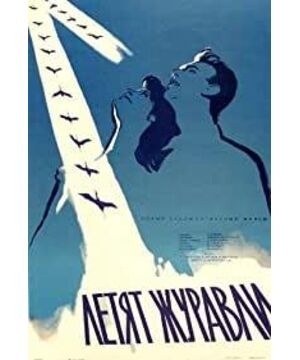Text: Mu Yu
Official account: put aside the book
"The wild geese lined up in an adult shape, flying towards the clouds, gray, white, and a long nose." Veronica (Tajiana Samoylova) confronted Boris (Aller) next to her. Kesai Bataloff) said.
The wild geese flew south, and they soared freely in the sky.
You embark on the smoke-filled train leading to the front line, but you stay on that land forever.
Speaking of the movie "Goose Nanfei", some people may think of that poignant love story. As the only film in the former Soviet Union to win the Palme d'Or at the Cannes International Film Festival in France , its story is not appealing. A couple in love separated due to the war, the hero Boris volunteered to join the army, unfortunately died on the battlefield. After Boris joined the army, the heroine Veronica failed to resist the temptation of his younger brother and lost herself to him, and was blamed by the world. The cheerful Veronica was therefore depressed, and finally chose to divorce and continue to wait for her beloved. Things backfired, and what was waiting was the news of Boris' death. The subject matter of the story is not eye-catching, nor is it amazing. But light usage and lens scheduling are one of the many factors in the film's success.
Light is the soul of the movie. It can shape the image of the characters, express the visual style of the movie, and portray the inner activities of the characters from the side, highlighting the environmental background. "Goose Flying to the South" is a black-and-white movie of the 1950s with the background of World War II. In such a war-themed film, the light reduces the cruel and depressing sense of the war, and achieves a visual effect that even in the chaos of war, there is still a touch of warmth in life. In addition to revealing the role of the general environment, it also plays a suggestive effect.
The light and shadow art shot that reminds me of Boris and Veronica stand together. Boris's face was dark and almost dull, while Veronica's face was slightly bright. The contrast of the light on the two faces hinted at the fate of Boris' death after joining the army. Love stories in the context of war are now very common themes. Director Mikhail Karatozov used the flying geese to start the film. They flew across the sky in groups. There were only Veronica and Boris in the empty square. The overhead shot showed the two chasing and fighting scenes. A glance. The effect of light and shadow is more prominent, and the shadows of the two people are getting longer and longer, and finally they meet together. The big wild geese in the sky and the happy two people in the square create a warm atmosphere. This place also fully reflects the common desire of the people during the war-a peaceful, happy and beautiful life.
Mikhail Karatozov was the first-generation famous film artist of the former Soviet Union and an advocate of poetry films in the 1950s. In the film style, he has always pursued poetry and film, using light and shadow art to highlight visual effects, and shooting the film with a prose-style narrative structure of "the shape does not disperse and the spirit does not disperse". "Goose Flying to the South" is a typical film that disperses and disperses. In my opinion, the "god" of this film is the cruelty of war, and the "shape" is the love story of Boris and Veronica, and Boris joined the army. The tragic fate of the death. The so-called poetic movies are people's desire for freedom, looking for light in the trough of life. The poetic film alludes to the living conditions of the social crowd, and is a microcosm of society.
The long shots used in the film from 28 minutes 40 seconds to 29 minutes 38 seconds fully show the parting scenes of soldiers who are about to join the army and their families. The most memorable shot was Boris climbing down the fence to look for Veronica. The shot slowly shifted the subject of the shooting to couples cuddling together, old couples hugging each other in the fence, children lying on the shoulders of grandfathers kissing each other, women The husband who joined the army said that he would send letters home every day, the newly married couple said goodbye to each other, and the delivery man who joined the army was taken over by a colleague who had not joined the army.
Here, shooting with shifting lens and objective perspective is used to vividly show the parting scenes of various classes and professional groups during the war. The screen enlarges the single shot of Boris and Veronica to the entire society, puts people first, enriches the delicate expression of emotions, further strengthens the cruelty of war, and sublimates the film. At the end of the movie, Veronica rushed to the train station with a small daisy in her hand, looking for Boris from the crowd who had defeated and returned. When he heard that Boris died for his country, he cried loudly.
"Give the flowers to whomever you want!"
After the officer next to her said this to her, there was lively music in the film. Veronica wiped away her tears. At this time, she rekindled her hope and courage to live, and distributed bunches of daisies to the soldiers who had returned victorious. The flowers are poetic, and the little daisies here represent the hope of life. It has the meaning of happiness, hope, and peace, which is consistent with the expressed thought of cherishing peace; it also has the meaning of "love deep in the heart", which reflects that Veronica's love for Boris will always be hidden in her heart;
I think a good movie does not need to be modified too much. It seems to be telling a poignant love story, but it actually centers on the love story and shows the cruelty of war. As one of the masterpieces of the poetic film genre, Mikhail once said, "A real film must be a poetic film, both in the play and in the image processing." For me, war-themed films are mostly killing and bloody. The visual effect is to have the stimulation of visual feast.
However, " Goose Flying to the South" abandons the shooting methods of previous war films, and uses the tragedy of the characters' fate, flowers with hope and grace, and brisk tunes to embody the cruelty of war silently. It is a landmark film with pioneering and innovative consciousness in the history of Soviet cinema. Yan Nanfei took away the gunpowder smoke, the poignant love between the Yin and Yang and the soul that was deeply in love. Cherish peace and be grateful for life.
Add the WeChat account paokaishubenxbb to join the national fan group
View more about The Cranes Are Flying reviews






